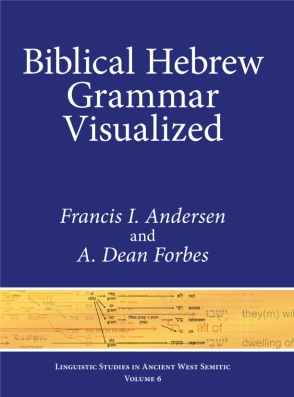Biblical Hebrew Grammar Visualized
Francis I. Andersen and A. Dean Forbes
In Biblical Hebrew Grammar Visualized, Andersen and Forbes approach the grammar of Biblical Hebrew from the perspective of corpus linguistics. Their pictorial representations of the clauses making up the biblical texts show the grammatical functions (subject, object, and so on) and semantic roles (surrogate, time interval, and so on) of clausal constituents, as well as the grammatical relations that bind the constituents into coherent structures.
- Description
- Table of Contents
The book carefully introduces the Andersen-Forbes approach to text preparation and characterization. It describes and tallies the kinds of phrases and clauses encountered across all of Biblical Hebrew. It classifies and gives examples of the major constituents that form clauses, focusing especially on the grammatical functions and semantic roles. The book presents the structures of the constituents and uses their patterns of incidence both to examine constituent order (“word order”) and to characterize the relations among verb corpora. It expounds in detail the characteristics of quasiverbals, verbless clauses, discontinuous and double-duty clausal constituents, and supra-clausal structures.
The book is intended for students of Biblical Hebrew at all levels. Beginning students will readily grasp the basic grammatical structures making up the clauses, because these are few and fairly simple. Intermediate and advanced students will profit from the detailed descriptions and comparative analyses of all of the structures making up the biblical texts. Scholars will find fresh ways of addressing open problems, while gaining glimpses of new research approaches and topics along the way.
1. Introduction: What We Mean by “Biblical Hebrew,” “Grammar,” and “Visualized”
2. Text Division
3. Parts of Speech
4. Phrase Marker Concepts and Terminology
5. The Basic Phrase Types of Biblical Hebrew
6. Complex Phrases in Biblical Hebrew
7. Main Clauses
8. Embedded Clauses
9. Classifying Clause Immediate Constituents
10. Semantic Role CICs
11. Introduction to Clause Immediate Constituent Composition, Incidence, and Ordering
12. The אמר Corpus
13. The היה Corpus
14. The עשה Corpus
15. The נתן Corpus
16. Makeup of Clause Immediate Constituent Subtypes
17. Computing the Distances between Verb Corpora
18. The Five Quasiverbals
19. Verbless Clauses
20. Non-Tree Phrase Markers
21. Discourse Analysis and Supra-Clausal Structures
Appendix 1. Text Choice, Corrections, and Reductions
Appendix 2. Our Approach to Linguistics
Appendix 3. Alternate Approaches to Positional Syntax
Appendix 4. Indirect Object Alternation in the
אמר Corpus
Appendix 5. Compositional Analysis
Appendix 6. Two-CIC VLCs as Novel Sentences
Appendix 7. Enhancements to Our Database
Glossary
Bibliography
Indexes
Index of Authors
Index of Scripture
Index of Topics
Mailing List
Subscribe to our mailing list and be notified about new titles, journals and catalogs.




